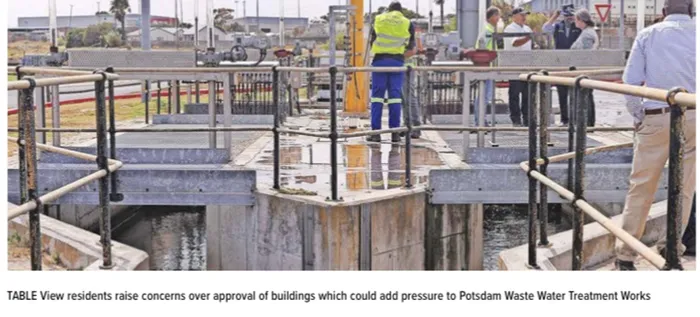Potsdam sewage works blamed for lagoon water quality and foul smell

Table View residents raise concerns over approval of buildings which could add pressure to Potsdam Waste Water Treatment Works.
Cape Town - Milnerton residents who sought answers over Lagoon water quality and the sulphur smell in the area claim the Potsdam sewage works is largely to blame.
According to RethinkTheStink and Milnerton Central Residents Association, city officials alleged there were no known spills in the area after weeks of complaining of worsening conditions and urgent requests that a pollution inspection team be sent out.
The organisations employed an accredited independent testing company, Makoya Amanzi to test the water testing done on November 4, and results came out last week.
“The water testing showed treated effluent containing 750 000 E Coli cfu/100ml (licence requirement is <1000 cfu/100ml) was being discharged into the Diep River at an estimated rate of over 36 million litres per day,” the organisations said.
They claim the amount of discharge into the Diep River was enough to fill 18 Olympic size swimming pools.
The city has been blamed for failing to take urgent action to comply with legal limits causing environmental and economic impact “Compliance with a directive is mandatory.
Residents cannot be expected to continue to tolerate the stench and pollution until 2026 without suitable interim measures being put in place,” the organisations said.
Last month the area experienced dead fish washing up, after about 500 fish washed up in March, causing greater public health risk and ecological damage concerns.
The water is not suitable for recreational use.
City’s acting mayco member for water and sanitation, Siseko Mbandezi said the City monitors the operations of the Potsdam Wastewater Treatment Plant closely and every effort was made to address issues that are detected or identified.
“It must be noted that a water sample reflects a particular moment in time and cannot be extrapolated to draw broader conclusions.
“The City would like to engage with ReThinkTheStink regarding their results, and will furthermore convene a community meeting on November 30, where we will update the public on the current interventions and conditions of the Milnerton Lagoon.
“We encourage the community to attend this session,” said Mbandezi.
He acknowledged that the Milnerton Lagoon was in an ecologically poor state, caused by pollution entering the system from various sources.
The City has appointed environmental consultants to help investigate and assess possible short-term interventions.
According to Mbandezi, the foul stench was believed to be caused by the sediment which is anoxic in the lagoon, which stems from accumulative contributing pollution factors.
Cape Times
Related Topics: